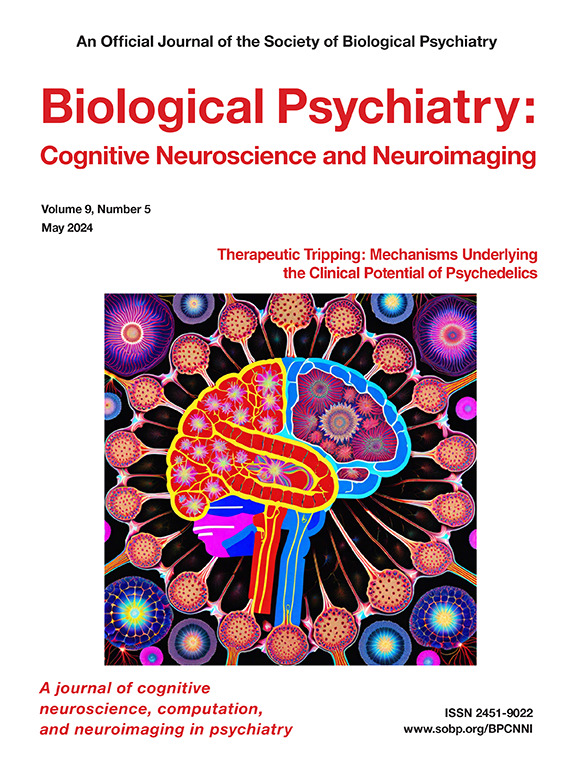阿尔法调节功能失调是严重精神疾病患者工作记忆受损的机制之一。
IF 5.7
2区 医学
Q1 NEUROSCIENCES
Biological Psychiatry-Cognitive Neuroscience and Neuroimaging
Pub Date : 2024-12-01
DOI:10.1016/j.bpsc.2024.07.022
引用次数: 0
摘要
背景:精神病和情绪障碍患者的工作记忆会受到干扰,但其潜在机制仍不清楚。我们重点研究了两种潜在机制:首先,注意力不集中应与脑电图中刺激前阿尔法波段活动水平升高有关,而工作记忆编码受损应与刺激后阿尔法抑制减少有关:我们收集了 68 名精神分裂症患者、43 名有精神病史的双相情感障碍患者、53 名重度抑郁症患者以及 90 名健康对比受试者(HCS)在完成空间工作记忆任务时的脑电图数据。我们从行为反应中量化了注意力缺失、记忆精确度和记忆容量,并使用传统的小波分析和一种从脑电信号非周期性元素中分离出振荡α功率的新方法量化了α:我们发现:(1) 使用传统小波分析法估测的刺激前 alpha 功率越大,预测行为错误越大;(2) 患者组中刺激后 alpha 抑制减少;(3) 抑制减少与记忆存储可能性降低有关。然而,我们还观察到,与患者相比,刺激前α在高危人群中更大,单次试验分析表明,预测行为错误的是刺激前脑电的非周期性元素,而不是振荡α:这些结果表明,重性精神病患者的工作记忆障碍主要反映了刺激后编码过程的障碍,而不是刺激开始前注意参与的减少。本文章由计算机程序翻译,如有差异,请以英文原文为准。
Dysfunctional Alpha Modulation as a Mechanism of Working Memory Impairment in Serious Mental Illness
Background
People with psychosis and mood disorders experience disruptions in working memory; however, the underlying mechanism remains unknown. We focused on 2 potential mechanisms: poor attentional engagement should be associated with elevated levels of prestimulus alpha-band activity within the electroencephalogram (EEG), whereas impaired working memory encoding should be associated with reduced poststimulus alpha suppression.
Methods
We collected EEG data from 68 people with schizophrenia, 43 people with bipolar disorder with a history of psychosis, 53 people with major depressive disorder, and 90 healthy comparison subjects while they completed a spatial working memory task. We quantified attention lapsing, memory precision, and memory capacity from the behavioral responses, and we quantified alpha using traditional wavelet analysis as well as a novel approach for isolating oscillatory alpha power from aperiodic elements of the EEG signal.
Results
We found that 1) greater prestimulus alpha power estimated using traditional wavelet analysis predicted behavioral errors; 2) poststimulus alpha suppression was reduced in the patient groups; and 3) reduced suppression was associated with a lower likelihood of memory storage. However, we also observed that the prestimulus alpha was larger among healthy control participants than patients, and single-trial analyses showed that it was the aperiodic elements of the prestimulus EEG—not oscillatory alpha—that predicted behavioral errors.
Discussion
These results suggest that working memory impairments in serious mental illness primarily reflect an impairment in the poststimulus encoding processes rather than reduced attentional engagement prior to stimulus onset.
求助全文
通过发布文献求助,成功后即可免费获取论文全文。
去求助
来源期刊

Biological Psychiatry-Cognitive Neuroscience and Neuroimaging
Neuroscience-Biological Psychiatry
CiteScore
10.40
自引率
1.70%
发文量
247
审稿时长
30 days
期刊介绍:
Biological Psychiatry: Cognitive Neuroscience and Neuroimaging is an official journal of the Society for Biological Psychiatry, whose purpose is to promote excellence in scientific research and education in fields that investigate the nature, causes, mechanisms, and treatments of disorders of thought, emotion, or behavior. In accord with this mission, this peer-reviewed, rapid-publication, international journal focuses on studies using the tools and constructs of cognitive neuroscience, including the full range of non-invasive neuroimaging and human extra- and intracranial physiological recording methodologies. It publishes both basic and clinical studies, including those that incorporate genetic data, pharmacological challenges, and computational modeling approaches. The journal publishes novel results of original research which represent an important new lead or significant impact on the field. Reviews and commentaries that focus on topics of current research and interest are also encouraged.
 求助内容:
求助内容: 应助结果提醒方式:
应助结果提醒方式:


